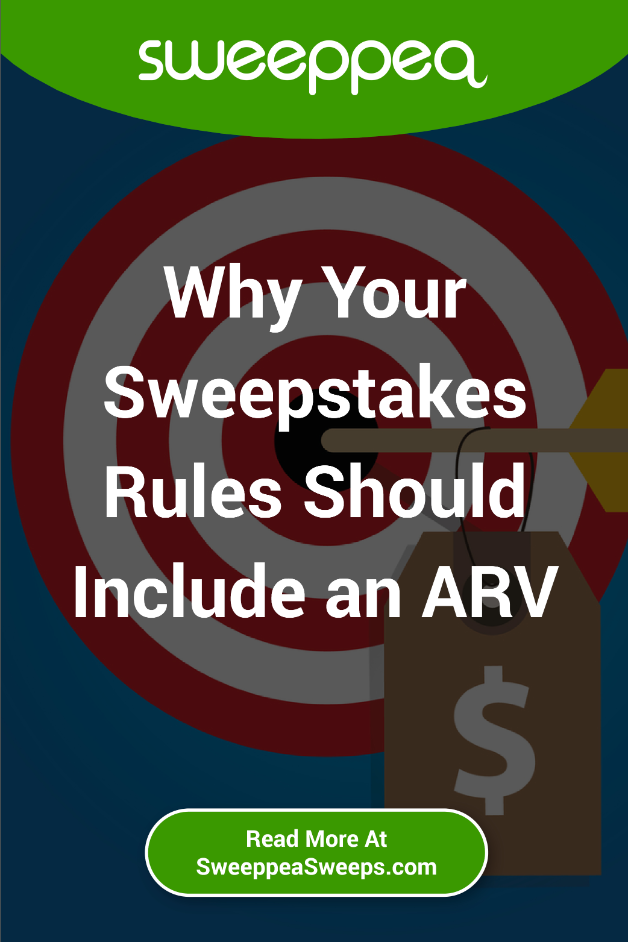
When you write your sweepstakes rules, or the Official Rules, it’s customary to disclose the Approximate Retail Value (or “ARV) of the prize you’re giving away. In fact, many state laws and regulations require that businesses include the ARV.
Here is what you need to know about the ARV.
What is ARV?
ARV is the monetary value the prize is worth if it were to be redeemed for cash. For a cash prize, the ARV is simply the dollar amount of the prize. However, for non-cash prizes such as cars, the ARV may vary.
The method of determining a non-cash prize ARV varies. While most companies use the cost a winner would pay to purchase the prize or the advertised retail price of the product, others use the Manufacturer’s Suggested Retail Price (MSRP) as the ARV.
Why is ARV an Important Part of Your Sweepstakes Rules?
Aside from including the ARV because it may be required by state law, there is another reason you want to include it: taxes.
The IRS will determine the amount of taxes the winner owes on the prize based on the Fair Market Value (FMV) of the prize. The FMV refers to the current market value that the winner could potentially sell the prize for.
If a participant wins a prize with an ARV of $600 or more, your company will need to send them an IRS Form 1099-MISC. You’ll also have to file it with the IRS directly.
In some states, your sweepstakes may also have to be registered and bonded. New York and Florida require that companies register and bond their sweepstakes if the total ARV of the prizes exceeds $5,000.
In Rhode Island, there is no bonding requirement but the registration requirement applies if the prize is worth $500 or more and if the sweepstakes is conducted by a brick and mortar business with promotions taking place inside of a retail location.
This is essential for your promotion to be considered as a legal sweepstakes in those states.
How Do You Calculate the ARV?
While the ARV might be easy to calculate for some prizes, in other cases it could be a bit more complicated.
Here are some basic rules to follow:
Base ARV on the Retail Value, Not Your Cost
Some companies base the ARV on the cost they paid for the prize. But, if you received the prize at a significant discount, or paid wholesale price or if it’s your own product, this amount may be significantly different than what the prize winner would pay if they purchased the prize themselves.
So you should always disclose ARV as the retail value, not what it cost your business.
Use a Standard Formula for Travel Prize ARV Calculation
Travel prizes are one of the most difficult categories of prizes when it comes to determining ARV. This is because airfare and accommodation rates can fluctuate significantly, based on the date of travel and departure and arrival locations.
In this case, you can take these steps to calculate the ARV :
- Obtain quotes from multiple travel agencies and online websites for the dates the winner will travel .
- Base the ARV on the average of these quotes for airfare and ground transportation, along with the rate your company is willing to pay for accommodations and any other amenities that may be included.
Take care in your calculation as the winner may decide to dispute the ARV in order to lower their tax bill, since the amount of taxes owed is based on the FMV.
In fact, winners are more likely to challenge the ARV on a travel prize for this very reason.
Make Sure to Calculate the Total ARV
Some companies overlook calculating the total ARV for all of the sweepstakes prizes combined. Don’t ignore this in your Official Rules, especially if it’s possible for the winner to purchase all of the prizes as a bundle at retail value.
If you don’t calculate the total ARV, a winner could tally it on their own and then dispute it if it turns out to be higher than the FMV for the prizes purchased as a bundle.
Calculating ARV for your sweepstakes rules can be complicated. It’s highly recommended that you retain legal counsel to help you determine the ARV and assist you with any registration and bonding requirements that may arise.
Need help with sweepstakes or contest management? Call 305-505-5393 or email us with your questions.

